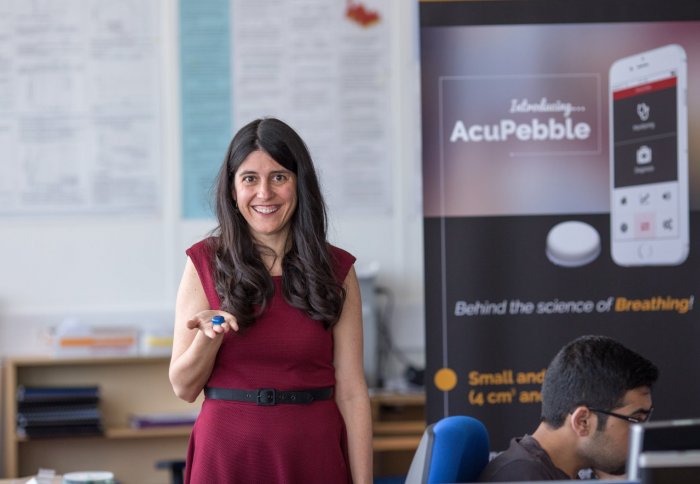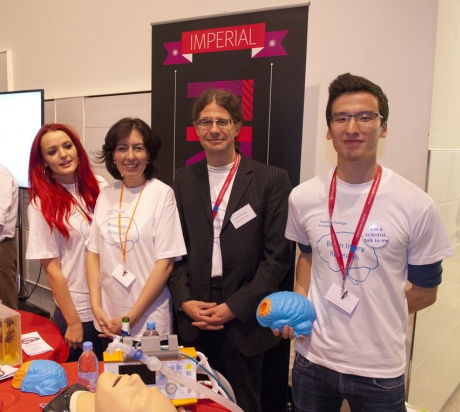Imperial celebrates as over 100 academics move up

Professor Esther Rodriguez Villegas with the AcuPebble device
The 2015 round of academic promotions has recognised over 100 academics in fields as diverse as brain injury and catalysis.
108 members of academic staff have been promoted, from across the Faculties of Engineering, Medicine, Natural Sciences, and the Business School.
I am delighted to congratulate the members of staff across the College’s faculties who have been promoted
– Professor Stephen Richardson
Stephen Richardson, Associate Provost (Institutional Affairs), said: “It’s always a privilege to read through the promotion applications, and their high standard reflects the excellence in research and teaching that goes on at the College year-round. I am delighted to congratulate the members of staff across the College’s faculties who have been promoted – each promotion is the result of much hard work and dedication.”
A full list of the 2015 academic promotions can be found here.
Below, we meet four of the newly promoted staff: Professor Esther Rodriguez Villegas (Electrical and Electronic Engineering), Dr Robert Dickinson (Surgery & Cancer), Dr Lara Cathcart (Finance), and Dr Silvia Diez-Gonzalez (Chemistry).
Professor Esther Rodriguez Villegas, Department of Electrical and Electronic Engineering

Professor Esther Rodriguez Villegas
Esther Rodriguez Villegas has been promoted to Professor of Low Power Electronics. Her recent research interests focus on developing wearable sensors for monitoring patient vital signs. For example, she has developed a wearable wireless device, approximately the size of a pound coin, which sticks on the patient’s neck or chest, discreetly underneath their clothes. The AcuPebble device continuously monitors, in real-time, the sounds emanating from the heart and respiratory system, wirelessly transmitting data to a doctor. It can be used as a diagnostic tool, a health monitor or an early warning device for a range of illnesses. These include chronic obstructive pulmonary disease (COPD), sleep apnoea, whooping cough and congestive heart failure.
Being a professor at Imperial is the pinnacle of my career so far. It is a massive recognition of our work and gives me motivation to reach even higher goals in the future.
– Professor Esther Rodriguez Villegas
Professor Rodriguez Villegas leads a multi-disciplinary team of 13 postdocs and PhD students in the Department. She credits sharing the highs and lows with them as a major motivator in her career.
“For me my team is not just a group of people gathered in the same location for many hours doing work. It is a bit like a second family. We all share the same goals, care about each other, are happy when things in the lab go well and help each other out when our work doesn’t bear fruit. My team is really the greatest thing about being at work and this promotion reflects their amazing work as well. Being a professor at Imperial is the pinnacle of my career so far. It is a massive recognition of our work and gives me motivation to reach even higher goals in the future.”
Dr Robert Dickinson, Department of Surgery & Cancer
Dr Robert Dickinson has been promoted to Senior Lecturer. In 1998, Dr Dickinson and his colleagues discovered how xenon gas interacts with the human nervous system to bring about anaesthesia. It was this discovery that set Dr Dickinson on the path to becoming a Senior Lecturer in the Department of Surgery & Cancer, where he is researching new applications of xenon to reduce the devastating consequences of traumatic brain injury.

Dr Robert Dickinson at a Science Uncovered event
Dr Dickinson said: “For traumatic brain injury there is currently no drug that can prevent the chain reaction that wreaks havoc on the brain in the hours following a fall or a road accident. We believe that xenon could fill this gap; it could even be carried on ambulances and given to patients on the way to hospital”.
Imperial is such a fantastic place to be doing this research. Working with highly talented students and staff from all over the world is the secret to our success as a team.
– Dr Robert Dickinson
Dr Dickinson uses models of brain trauma to test new treatments, like xenon, and to understand how they work.
“Imperial is such a fantastic place to be doing this research. Working with highly talented students and staff from all over the world is the secret to our success as a team. In addition, the opportunities for public engagement have been invaluable. People who have experienced brain injury from an accident or stroke have shared their stories at public engagement events we participated in and this has been tremendously motivating for the research team,” said Dr Dickinson.
For students and early career scientists, Dr Dickinson, whose background is in Biophysics, advises that it is important to study and work on what interests you because you never know how an unexpected finding can lead you down a new path – in his case, from the pharmacology of an inert gas to a potential treatment for brain injuries.
Dr Lara Cathcart, Imperial College Business School

Dr Lara Cathcart
Dr Lara Cathcart has been promoted to Associate Professor of Finance. She is the Academic Director of the MSc Finance and MSc Risk Management and Financial Engineering programmes, and is also a lecturer and supervisor to students at MSc, MBA and PhD level at Imperial College Business School.
Reflecting on her career in the traditionally male-dominated world of finance, Dr Cathcart hopes that other female academics will take inspiration from her promotion. “I’m delighted to receive this promotion and to be recognised for my research and teaching among my peers, both at Imperial and within the wider global research community. My career in finance has been incredibly rewarding, but like other senior faculty who specialise in science and engineering, we face the challenge of how to attract more women into this area.”
What advice would she offer more junior academics who are looking to progress in their careers? “Find a really good mentor to help guide you in the early stages and make sure you build up a strong network among your peers. It’s also important to find out about the criteria for promotion so you can properly plan your career path.”
Dr Silvia Diez-Gonzalez, Department of Chemistry

Dr Silvia Diez-Gonzalez
Dr Silvia Diez-Gonzalez has been promoted to Senior Lecturer in Catalysis. Her research focuses on making reactions more sustainable and easier to perform by finding the best catalyst. Catalysts are important in facilitating reactions, so improving the process could lead to new medicines and materials.
Dr Diez-Gonzalez was among the first cohort of Junior Research Fellows at Imperial – a scheme that aims to support the brightest early career researchers for three years by allowing them to focus on their research.
“The Junior Research Fellowship gave me the chance to start a career,” said Dr Diez-Gonzalez. “It’s a great opportunity that allowed me to pursue the research I wanted to do.” One and a half years into the fellowship she applied for a lecturer position and got it. She now heads her own research group in catalysis. “It was the beginning of everything,” she said.
Article text (excluding photos or graphics) © Imperial College London.
Photos and graphics subject to third party copyright used with permission or © Imperial College London.
Reporter
Nancy W Mendoza
Communications and Public Affairs
Elizabeth Nixon
Communications Division
Hayley Dunning
Communications Division
Laura Singleton
Communications Division
Colin Smith
Communications and Public Affairs